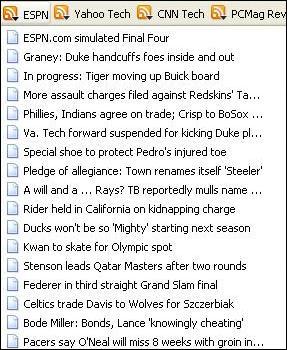RSS news feeds are becoming more and more popular among Internet communities. Have you ever seen buttons like this ![]() or this
or this ![]() ? If so, then you have seen the common markers of RSS feeds. If you are like most Internet users and use Microsoft Internet Explorer as your primary Internet browser, you may have not had the chance to use RSS feeds. Over the next few days I hope to shed a little light on the subject of RSS feeds and give some tips to get you started. I must give warning that once you get started using RSS feeds you’ll never want to go back to the way things used to be.
? If so, then you have seen the common markers of RSS feeds. If you are like most Internet users and use Microsoft Internet Explorer as your primary Internet browser, you may have not had the chance to use RSS feeds. Over the next few days I hope to shed a little light on the subject of RSS feeds and give some tips to get you started. I must give warning that once you get started using RSS feeds you’ll never want to go back to the way things used to be.
Over the next few days I’ll try to answer some of the most frequently asked questions (FAQ) about RSS feeds. Next week, I’ll give a brief tutorial on how to subscribe to RSS feeds on Families.com and your other favorite sites.
● What does RSS stand for?
RSS stands for Real Simple Syndication. The name, of course, implies simplifying your life somehow. In this case, the object is to simplify the way you browse and read news stories, blogs, and pretty much any type of information on the Internet.
● What are RSS feeds?
RSS feeds are one way that content providers, such as Families.com, let you know about new and recent posts on their site. Feeds are usually organized as lists of multiple headlines viewed at once so you can easily browse all of the new content without actually going to each specific page. RSS feeds are used on various different sites such as news, sports, entertainment, blog, and product review sites. Feeds can list things such as new blog posts, articles, forum posts, and news headlines. Below is a picture of a feed from ESPN.com using the built-in RSS feed viewer on the Firefox Internet browser. As you can see, the listing shows headlines from the latest stories on the site.
If you see a headline and want to see the entire post or article, all you have to do is click on the headline and your Internet browser will link to the article. RSS feeds are updated often, so you’ll always have access to the latest postings on your favorite Web sites.
● Why aren’t RSS feeds easier to use?
RSS was initially developed as a way of providing the latest headlines from popular news sites. The project, however, became too complicated and was dropped the founding company. Other companies began developing RSS primarily for bloggers who published their own content online. As a result, RSS feeds were created for those who are a little more computer savvy than the average user. That said, plenty of computer savvy people still sometimes have trouble with RSS feeds.
Over the past few years, however, setting up and using RSS feeds has become easier to do. Some Internet browsers allow you to simply click on an icon to subscribe to RSS feeds. Other stand alone programs, called aggregators, have RSS retrieval methods where you can easily find various RSS feeds to subscribe to.
● Can I use RSS feeds with Microsoft Internet Explorer?
Not currently. Internet Explorer version 6, the current version, does not directly support RSS feeds. You will need to use other RSS feed reader programs to read RSS feeds. The next version of Internet Explorer, due out later in 2006 is going to have built-in RSS feed reading capabilities. Until then, however, you’ll have to find another alternative.
Tomorrow
Tomorrow, we’ll continue to answer some of the most common questions about RSS feeds.


